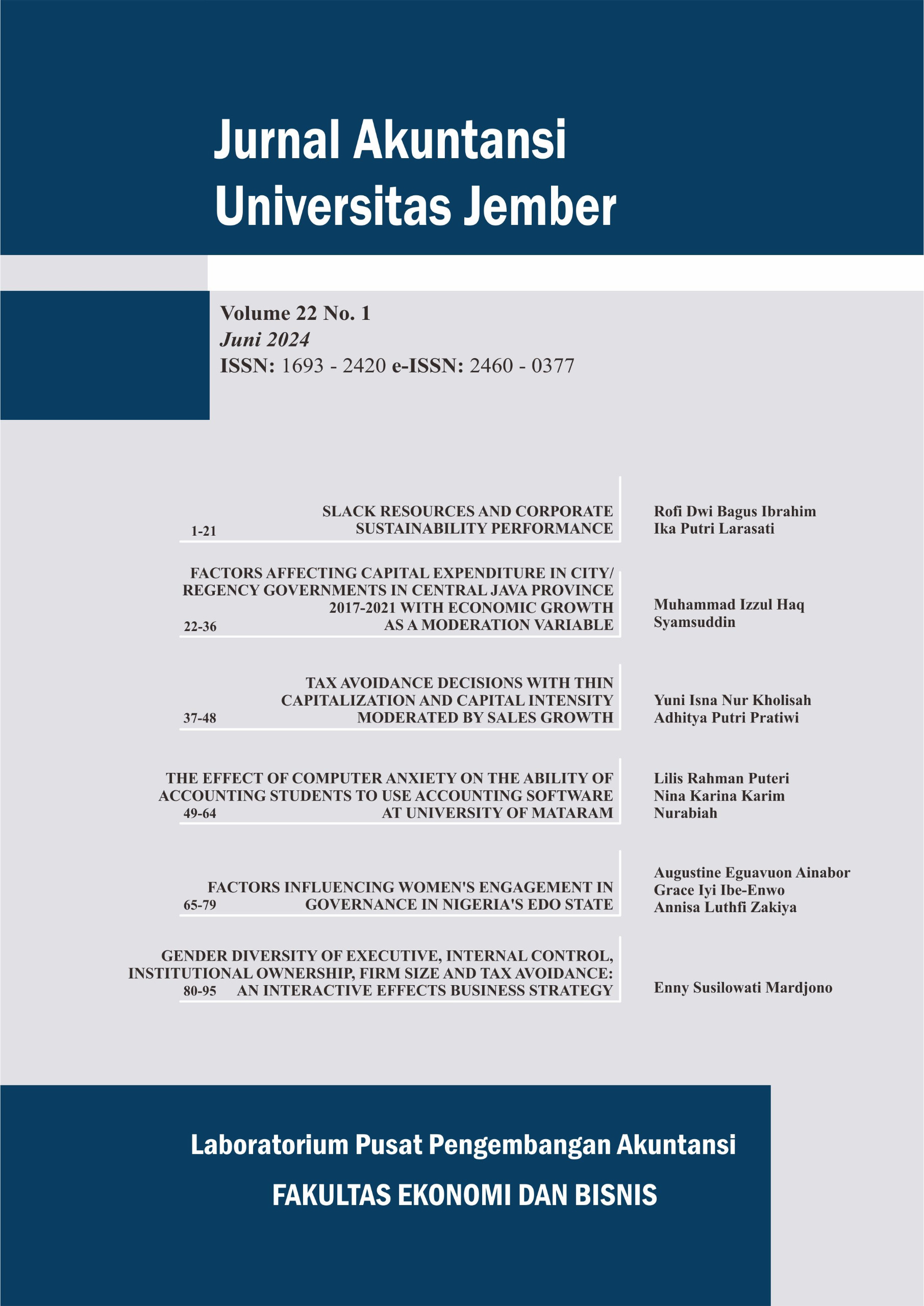FACTORS INFLUENCING WOMEN'S ENGAGEMENT IN GOVERNANCE IN EDO STATE OF NIGERIA
DOI:
https://doi.org/10.19184/jauj.v22i1.43285Keywords:
Education, Governance, Politics, Women ParticipationAbstract
ABSTRACT
The research examined the factors that influence women's engagement in governance, using Edo State, Nigeria, as a case study. It investigated the amount of influence of women's participation in government in Edo State, Nigeria. It also analyzed the extent to which education influences women's engagement in Edo State governance in Nigeria. To meet the stated goals, two hypotheses were developed to guide the investigation. Data was collected mostly through a questionnaire. The study's population consisted of 4,625 prominent lawmakers from Edo State's three senatorial districts, with a Taro Yamani formula-determined sample size of 368. The Chi-Square(X2) test of proportion was adopted in the analysis of data. After statistically analyzing the data obtained from the primary source, it was found that there is low women participation in the governance of Edo State, Nigeria. It was also discovered that there is a link between women's educational attainment and their poor engagement in government in Edo State, Nigeria. The findings of this study suggest that state governments should take policy action to encourage more women to engage in governance. The document advocated, among other things, that the Edo State government foster girl-child and women's education as a deliberate strategy to ensure that more women have access to quality education that will prepare them to compete with males in the state's politics and governance.
Keywords: Education, Governance, Politics, Women Participation
Downloads
References
Agbalajobi, D (2021). Nigeria Has few Women in Politics: Here is why and what to do about it. https://theconversation.com May, 3.
Agbalajobi, D. T (2017). A Historical Perspective of Women Participation in Politics, Ife Social Sciences Review, 25(2), 33 - 47
Ajibade, D; Ocheni, M. M & Adefemi, A (2012). Factors Militating against Women Active Participation in Politics in Ofu Local Government Area of Kogi State, Nigeria. Current Research Journal of Social Sciences, 4(6), 459-465.
Aluko, Y. A. (2011). The Consequences of Gender and Women’ Political Leadership in the Nigerian Context. Proceedings of the 16th Annual Conference of Anthropological and Sociological Association of Nigeria. University of Ilorin, Nigeria.
Banda, J. (2021). Foreword, Women’s Political Participation: Africa Barometer 2021. 2021 International Institute for Democracy and Electoral Assistance (IDEA), Stromsborg Stockholm, Sweden.
Beauvoir, S (1953). The Second Sex, New York: Vintage
Dimkpa, D. I. & Wilcox, L. A. (2008). Perceptions of Women on Factors Responsible for Low Female Participation in Politics in Port-Harcourt, Rivers State, Nigeria. Journal of Research Development, 10(1), 22-27.
Goldberg, S. (1977). The Inevitability of Patriarchy, London: Temple Smith.
Hadjis, J. (2003). Women in Mauritian Parliament: The Under-representation of Women in Mauritian Parliament. Thesis Submitted to Inter-Disciplinary Studies Department, Royal Roads University, Mauritius.
Hamadeh–Banerjee, L & Hadjis, J (2013). Women’s Agency in Governance, Women’s Political Participation and Good Governance: 21st Century Challenges, New York: UNDP.
Kasomo, D (2012). Factors Affecting Women Participation in Electoral Politics in Africa. International Journal of Psychology and Behavioural Sciences, 2(3), 57-63.
Maveneka, L. (2004). Mozambique’s Family Law Passes!. Oxfam America News Update, 8th of January.
Millet, K. (1969). Sexual Politics, New York: University of Illinois Press.
Oronsaye-Salami, I. I (2005). Emerging from the Shadows: Changing Patterns in Edo Women’s Political participation. A Paper Presented at the Edo National Association in the America’s 14th Annual National Convention, Elizabeth, New Jersey from 2nd – 4th September.
Shvedova, N. (2007). Obstacles to Women’s Participation in Parliament. In Women in Parliament: Beyond Numbers, Handbook by the International Institute for Democracy and Electoral Assistance, IDEA.
Singh, S. (2011). Challenges Faced by women for Vertical Mobility in Politics: A Comparative Study of Sweden and India, Handledare: Anders Hyden.
Suleiman, I (2017). The Role of Women towards Political Participation in Nigeria. American Economic & Social Review, 1(1), 15-44.
The Nigeria CEDAW/ NGO Coalition Shadow Report (2008) submitted to the 41st Session of The United Nations Committee on the Elimination of All Forms of Discrimination Against Women for consideration by the CEDAW Committee in its Review of the Government of Nigeria’s 6th Periodic Country Report (2004-2008) on the implementation of CEDAW in Nigeria.
Tong, J. (2003). The Gender Gap in Political Culture and Participation in China. Communist and Non-Communist Studies, 36 (2), 131– 150.
United Nations. (2020). United Nations Statistics Division, United Nations Global SDG Database. Data as of 1st January. Retrieved 1st August, 2020
UNDP (2009). Human Development Report 2008-2009: Achieving Growth with Equity, Nigeria: UNDP.



